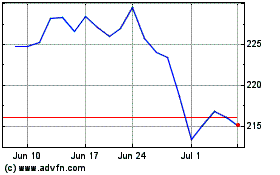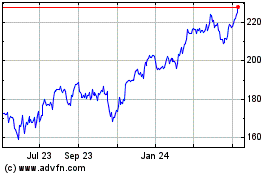By Kathy Chu
LONG AN, Vietnam--This rural expanse of pineapple fields and
mango trees south of Ho Chi Minh City is a good place to see how
the winds of global trade are shifting.
Already, massive factories have sprung up here to make goods for
Western companies such as sportswear maker Nike Inc., taking
advantage of Vietnam's young workforce and wages that are roughly
half those in China.
This largely agricultural province, located near Vietnam's most
populous city, now has more than a dozen industrial parks, and is
playing host to an increasing amount of manufacturing. By May, it
had attracted pledges of $3.67 billion for foreign investment,
about 40% of it for the garment and textile industry.
Economists say this growth could accelerate if the U.S. and 11
other Pacific Rim nations ratify the Trans-Pacific Partnership
agreement, a landmark trade deal concluded earlier this month. The
deal would eliminate certain tariffs between members, mostly
benefiting developing nations such as Vietnam and Malaysia, whose
growth depends heavily on exports.
The trade agreement would be "fantastic if it happened," says
Frank Smigelski, a vice president at Avery Dennison Corp., one of
the world's biggest makers of clothing labels and tags. In July,
the company, which is based in Glendale, Calif., opened a
300,000-square-foot facility in Long An. Inside,
sewing-machine-like contraptions print tags for Japanese clothing
brand Uniqlo, while workers pour red ink into giant machines that
print the labels sewn into North Face outdoor-sports clothes.
The TPP "would encourage more garment manufacturers to push
volume here, " says Mr. Smigelski. "The more they come, the more
we'd benefit."
Skyrocketing wages and a growing labor shortage in China are
heightening Vietnam's appeal. The country's growth has waxed and
waned since the 1980s, when its leaders ushered in an era of
market-oriented reforms.
Last year, foreign direct investment into Vietnam totaled $12.4
billion, up nearly a quarter from 2009. One of the biggest
investors is South Korea's Samsung Electronics Co., which plans to
nearly double its current $4.5 billion investment in manufacturing
electronics in the country.
If the trade deal goes through, Vietnam's economy would be the
single largest beneficiary, because it would gain much greater
access to large consumer markets, according to the Peterson
Institute for International Economics, a Washington-based think
tank.
The pact "gives those inside privileged access to the U.S. and
Japan," said Chris Clague, a senior consultant at the Economist
Intelligence Unit.
The Vietnamese government estimates that TPP could boost
Vietnam's economy by $33.5 billion during the next decade, roughly
a fifth of the country's current gross domestic product. Exports
from its key garment and footwear industry, one of the biggest TPP
beneficiaries, could jump 46% to $165 billion by 2025 as tariffs
gradually fall to zero, the Peterson Institute says.
Money pouring into the Southeast Asian economy could make
Vietnam one of the world's two fastest-growing large economies
between now and 2050, along with Nigeria, if overall trade
restrictions continue to lift, according to consulting firm
PricewaterhouseCoopers.
In Long An province, Avery Dennison's gleaming three-story
factory, located in an industrial park dominated by Japanese and
Korean investors, is preparing for a surge in orders for
garment-care tags, labels and price tags.
Down the street, dozens of concrete homes for factory workers
are sprouting among the tall weeds that still cover parts of the
area, a sign that other manufacturers are coming here too.
The Long An facility should give Avery Dennison room to grow
through 2020, but the company will consider expanding if apparel
production surges because of the trade deal, Mr. Smigelski
says.
How much Avery Dennison and others in Vietnam's apparel industry
benefit from the trade deal will depend on the final details.
Many analysts expect the deal to require that everything from
yarn to the final garment itself come from member countries in
order to qualify for the elimination of tariffs, a stipulation
favored by U.S. yarn and textile producers.
Such a rule could leave manufacturers scrambling to comply since
Vietnam imports most yarn and fabrics from China and other
countries that aren't part of the pact. In the long term though, a
strict local-content rule could push even more apparel-making
business to Vietnam if yarn and fabric weavers are forced to set up
in the country, Mr. Smigelski says.
Avery Dennison has begun to do more sophisticated manufacturing
in Vietnam, using giant looms to produce Nike's lightweight shoe
uppers. A machine with yellow and green harnesses holding spools of
yarn makes a deafening click-clack sound as it rapidly imprints a
silhouette of a leaping Michael Jordan on the high-end shoes, which
retail for about $200 a pair.
The skills of Vietnamese workers are increasing exponentially
every year, and the country is able to accommodate ever more
complex production, according to Avery Dennison.
"What took 30 years in China is taking 10 years in Vietnam to
happen," said Mr. Smigelski. That is why "more and more companies
are making bets on Vietnam."
Vu Trong Khanh in Hanoi contributed to this article.
(END) Dow Jones Newswires
October 18, 2015 20:01 ET (00:01 GMT)
Copyright (c) 2015 Dow Jones & Company, Inc.
Avery Dennison (NYSE:AVY)
Historical Stock Chart
From Mar 2024 to Apr 2024

Avery Dennison (NYSE:AVY)
Historical Stock Chart
From Apr 2023 to Apr 2024
